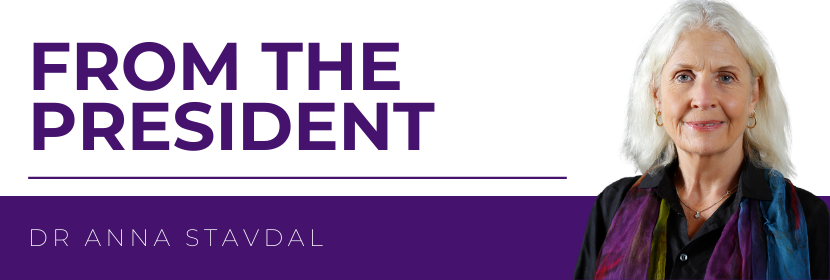From the President: March 2022
 Español Français 中文
Español Français 中文
“NO MAN IS AN ISLAND”
From: “Devotions upon Emergent Occasions”
by, John Donne, 1624
The evidence is mounting steadily and it’s convincing: Health systems based on Primary Care achieve better health results and at a lower cost. Primary Care is now considered a prerequisite for achieving Universal Health Coverage. This commitment appears in various high-level political agreements approved by international leaders during the last 5 decades. In 2018, when members and leaders of WHO and the UN approved the Astana Declaration, WONCA was broadly represented, as were many other professional organizations representing Primary Care health workers.
Nonetheless, this prioritizing of Primary Care has proved very difficult to implement. Certain counterforces are easily identified and well known, the most obvious being the growing fragmentation of all medical disciplines, and the rapid development of technology driven by strong commercial interests.
These are general trends and affect many aspects of society, health and education systems in particular. Neither WONCA nor individual doctors could possibly alter the direction of this development on their own. Once we understand how these global, societal trends impact our local, everyday context, however, we can mobilize pushback, from the bottom up.
This is where self-scrutiny helps.
I have experienced it time and again, in practice and in advocacy: although Primary Care givers from differing professions share the same vision, we too often fail to identify and utilize the potential for synergy that our collaboration offers. As the number of professions within Primary Care increases, are we at risk of withdrawing into separate silos, replicating the fragmentation we’ve watched increase within Secondary Care specialties? Might such fragmentation feed competition among Primary Care professionals? If so, where does that leave our patients?
For a reality check, let`s look at our own practices. You’re likely to recognize such questions as these: Who can offer the best care to a pregnant woman—her family doctor or the community midwife? Do Public Health Nurses have sufficient pharmacological knowledge to prescribe contraceptives, or should a medical doctor always be involved? Is the Community Health Worker just some cheaper stand-in for a fully qualified family doctor, or does his training enable him to make a unique contribution? What is the role of a Community Nurse with mental health training and experience as compared to that of a family doctor?
Two types of competition are implicit in these examples: competition for status, as in which Primary Care profession is hailed for providing the best care, and competition for assets, as in which Primary Care profession receives the most money. The bigger and more complex the local health system becomes, the more likely professional competition and protectionism become. Then, instead of joining forces, we risk leaving the patient in the crossfire of our professional interests. That won’t serve the well-being of our patients, of our professions, or of ourselves.
‘Task shift’ is the new gospel according to policy makers. What would be the impact on the quality of services if certain procedures traditionally carried out by the family doctor were taken over by other Primary Care professionals? Would that cause medical service delivery to fragment, threatening the comprehensive approach that is the very hallmark of family medicine? Or, we might adopt a team approach. Instead of insisting that only doctors carry out specific procedures, we can join together to build Primary Care teams, while also ensuring that the services delivered by the teams we participate in reflect and uphold the basic values of our trade: personal, continuous and comprehensive care. That seems to me to be the way forward.
We won’t stop advocating for everyone in the world to have a family doctor. On the way there, and beyond, however, we can also contribute, to the best of our ability, to providing good Primary Care in cooperation with our Primary Care colleagues from other professions. I know how clumsy that may feel at first, but I also know how quickly the added value begins to pay off, how the combined efforts of people from different professional perspectives and backgrounds create powerful synergies.
Let’s make it clear: Primary Care is not some ‘hospital-care light’. Clinical decisions are based largely on recognition of patterns, on what one has learned to expect. Decision-making assumptions that have been shaped through working with patients in the Secondary Care hospital context may not be valid within the context of Primary Care. Contexts differ, as do the rates and probabilities of diseases, depending on the context. Insight into epidemiological variations is crucial to tailoring clinical decisions to the population at hand. To a family doctor, this insight may seem so basic as to be self-evident. But it is not. We must emphasize it, with clarity, and make sure it remains as the foundation of Primary Care teams’ clinical decision-making—no matter how many, or which, professions are represented on the team.
Even though Primary Care teams are bound to differ—they too are impacted by their local contexts—recognizing and acknowledging the value of the team can foster the emergence of a common Primary Care professional identity. Through shared training and awareness, we can develop our team-playing skills. As with so much else, it’s a matter of trust and good communication.
WONCA is advocating co-training, within and on behalf of the Primary Care setting. My ambition is for this approach to be extended to the way WONCA works toward regional and global advocacy as well. Currently, we are exploring how we can ‘team up’ with other global professional networks to strengthen our advocacy for Primary Care. Yes, please. Health for all!
Dr Anna Stavdal
WONCA President